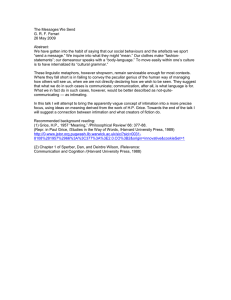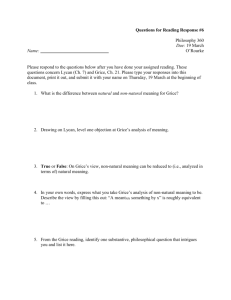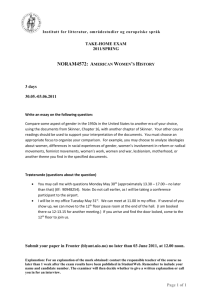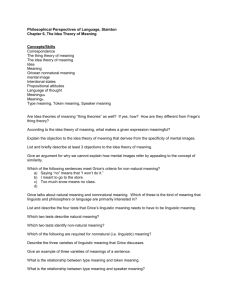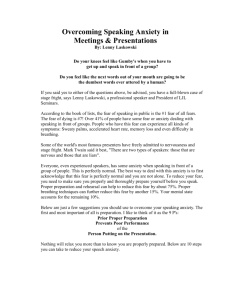Overcoming Fear of Public Speaking
advertisement
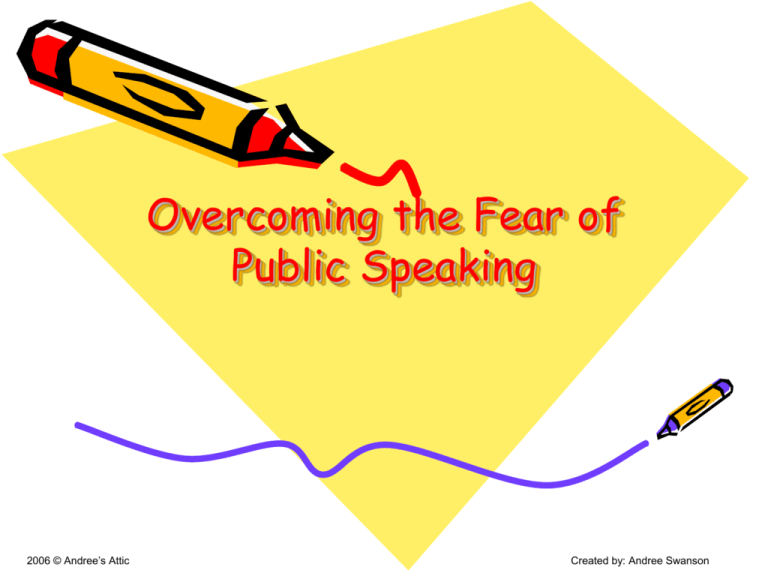
Overcoming the Fear of Public Speaking 2006 © Andree’s Attic Created by: Andree Swanson Fear of Public Speaking - Statistics • “20 - 85% of people experience more or less anxiety when they need to speak in public” (Public Speaking Anxiety, Para 1) The Book of Lists states… • “Speaking before a group” is the number one fear when 3000 Americans were asked “What are you the most afraid of?” (Grice and Skinner, p. 38) Communication apprehension defined • “the perceived fear or anxiety associated with either real or anticipated communication with another person or persons” (Grice and Skinner, p. 38) Jerry Seinfeld states… • “Surveys show that the #1 fear of Americans is public speaking. #2 is death. Death is #2. That means that at a funeral, the average American would rather be in the casket than doing the eulogy.” Picture courtesy of http://www.paramountcomedy.es/series/seinfeld/jerry.htm Reasons for getting nervous • There are five main reasons why one becomes nervous before a speech: – Unfamiliar situation – Lack of confidence – Sense of isolation – Fear of looking foolish – Fear of the consequences Unfamiliar situation • One enters into an environment that is strange or foreign • People who are not known to the speaker • Not having the right equipment • Missing equipment • Broken microphone • Bad seating arrangement Lack of confidence • When you are… – not fully assure of yourself or the topic – self-consciousness – not confident and something is bothering you – tense and have a frog in your throat – unaware of your audience Sense of isolation • Most fears come from the fact that you will be the center of attention Fear of looking foolish • the fear of forgetting your lines • being worried that people will find you non-competent Fear of the consequences • This is the fear of being judged • Lacking in ability • Lacking in insight or intelligence What causes nervousness? • The cause of anxiety for everyone is universal. “Adrenaline is suddenly pumped into the bloodstream. Respiration increases dramatically. So do heart rate and ‘galvanic skin response’—the amount of perspiration on the surface of the skin. All these things occur so that oxygen rich blood can be quickly channeled to the large muscle groups.” (Grice and Skinner, p. 38) Steps to overcome nervousness There are 3 main steps to help lower your sense of nervousness: • Prepare Your Speech To Be Effective • Know How To React To Your Stress • Try Calming Practices Preparing an effective speech • Being prepared for a speech should calm your anxiousness and nervousness the most. • Follow the 3 P’s: – Planning – Preparation – Practice (Study Skills, Para 3) Planning • First brainstorm for a topic – Make sure you know about the topic and make sure it interests you • Consider the purpose and the message you are trying to convey – Know your audience – Know your time limits • Make sure you understand your purpose Planning – know the speech principles • “What are the five function of an effective speech introduction? • “How should you construct the body of your speech, and how do you develop each key area” • “How can you use your voice and body to communicate your ideas” • “What strategies help you conclude your speech” • “What strategies help you word ideas correctly, clearly, and vividly” (Grice and Skinner, pp. 44-45) Five functions of an effective speech • Gain and maintain audience attention • Arouse audience interest in your topic • State the purpose of your speech • Establish your qualifications for speaking on the topic • Preview the main ideas to be discussed in your speech Preparing • Organize your speech – Develop your speech content • Organize your speech introduction, body of your speech, and the conclusion – Word your speech • Make an outline with your key points • Make key notes on note cards – Bulleted list (no sentences!) • NEVER write out your speech! Spontaneity • Speak extemporaneously • Avoid reading your speech “A little spontaneity adds a tremendous amount of character to your talk” (Universal Fears, Para 2) • Practice – – – – – Practice in front of a mirror in the shower in front of your family in front of your friends in front of your dog • If you are brave, record yourself and listen to your speech. Visualize • Visualize yourself giving a successful speech – “A study of 430 college speech students revealed lowered speech anxiety among those who visualized themselves delivering an effective presentation” (Grice and Skinner, p. 47) Guidelines for building confidence • • • • • • • • • Know Speech Principles Know Your Speech Believe In Your Topic View Speech Making Positively Visualize Success Project Confidence Test Your Message Practice Learn From Experience (Grice and Skinner 43) Now what do you do? • Know how you react to stress – this knowledge lets you predict and cope with these physical conditions – because you are anticipating these physical conditions, you will be better able to mask them from the audience • Know your strengths and weaknesses (Grice and Skinner 43-44) It always looks works worse than it is • Know that your vision of the situation looks far worse than it really is • Avoid apologizing for something you missed, as your audience may not be aware that you missed it – “Realize 90% of nervousness doesn’t show” (Universal Fear, Para 1). Before the speech • Show up early – Get familiar with your area and know what you have to work with (Universal Fear, Para 1). • “Concentrate on searching for current and immediate things that are happening at the event” (Stage Fright Strategies, Para 8). • Look over your notes again Speech time, feeling nervous? • What can you do? – Try these relaxing tips: – “Relax your body” (Study Skills, Para 2) – “Relax your voice” (Study Skills, Para 2) – “Concentrate on your speaking ideas” (Stage Fright Strategies, Para 10). – Breathe deeply, in and out, numerous times And the speech begins • • • • • • Look around for familiar and friendly faces Drop your hands Make eye contact Smile Practice breathing again Listen to yourself speaking and if necessary slow your speech ***Remember: The speech will be over before you even realize it*** References Grice, G. L., & Skinner, J. F. Mastering Public Speaking, 5th Edition. Boston: Allyn and Bacon, 2004. Katz, L. Public Speaking Anxiety. University of Tennessee at Martin Counseling and Career Services. 29 July, 2004. Retrieved June 8, 2005, from http://www.utm.edu/~ccenter/counseling/publicspeakinganxiety.html Public Speaking: Stage Fright Strategies. Advanced Public Speaking Institute. Retrieved June 8, 2005, from http://www.public-speaking.org/publicspeaking-stagefright-article.htm Study Skills. University of Bradford. Retrieved June 8, 2005, from http://www.brad.ac.uk/acad/civeng/skills/pubspeak.htm Universal Fears. The Leaders Institute. Retrieved June 8, 2005, from http://www.leadersinstitute.com/resource/publicspeakingtips2.html
